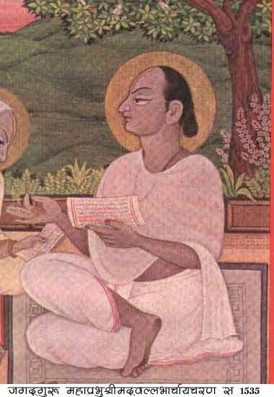Talk:The Ācāryas: Vallabhāchārya (1479 – 1531 CE)
By Vishal Agarwal
Śrī Mahāprabhu Vallabhācārya (1479–1531 C.E.) was a great devotee of Kṛṣṇa. He was born to a saintly couple from the Indian state of Āndhra Pradesh. They had gone to the holy Hindu city of Allahābād for a pilgrimage, when his mother was pregnant with him. Suddenly, the news arrived that an army of Muslims would invade the city, kill Hindus, and demolish the maṇḍiras. In fear, Vallabhācārya’s parents fled towards Central India. Due to the hardship of the journey, Vallabhācārya’s mother delivered him. But alas! The baby was born dead, and had no sign of life. In great grief, the couple wrapped the baby boy lovingly in a piece of cloth and placed him at the base of a tree. Then, they took shelter nearby to spend the night.
During the night, Kṛṣṇa appeared in their dreams and said, “Do not despair. I have brought your baby back to life. He is meant to be a great scholar of dharma, and will spread devotion to Me when he grows up.” The couple was overjoyed when they woke up, because they both had the same dream. They rushed to the tree and found that the baby was in fact alive. They unwrapped him lovingly and brought him home to raise him as a gift of Kṛṣṇa.
Vallabha indeed grew up to be a great scholar of Hindu dharma and a great saint who attracted numerous disciples, including the blind saint Sūradāsa. He frequently travelled to holy places associated with Kṛṣṇa, such as Mathurā and Vṛndāvana, where Kṛṣṇa had spent his childhood. He also inspired others to construct temples to Kṛṣṇa in the region, which had been devastated and plundered during the several centuries of Muslim rule earlier.
Story: Everything belongs to Kṛṣṇa
One day, while in Vṛndāvana, he learned that the Kṛṣṇa temple did not have enough money for food to offer to the Deity. Vallabhācārya ordered that the gold saucer of the temple be pawned to get the required amount. But when food was purchased with the money and offered to Kṛṣṇa’s mūrti, Vallabhācārya refused to accept even one morsel of the prasāda.
Till a devotee donated enough money and the temple restored the pawned gold saucer, Vallabhācārya did not eat anything. Finally, when he ate food for the first time in two days, he called his devotees and explained to them the cause of his fasting with tears in his eyes, “The gold saucer belonged only to Bhagavān. We had no right to pawn an item that already belonged to Him, and then consume the food purchased with that money. For this reason, I felt guilty and did not eat any of the food offered to Kṛṣṇa as prasāda, because that would mean stealing from Him. Now that the saucer is restored to Kṛṣṇa, I can eat the prasāda.”
Story: All the mūrtis of Bhagavān are sacred and holy
The mūrtis of Bhagavān Viṣṇu are of two types. One is the round śālagrāma stone. The śālagrāma is a natural black stone found in the bed of the Gaṇḍakī river that flows through Nepal, and in Bihār in India. It often has the shape of the Sudarśana cakra and the śaṅkha carried by Bhagavān Viṣṇu. Due to this, the śālagrāma is worshipped by Hindus as a manifestation or mūrti of Bhagavān Viṣṇu. The other is the regular four-armed human-form mūrti of Viṣṇu.
One day, a gentleman who had one of each type of mūrti came to visit Vallabhācārya and argued that the śālagrāma is a better mūrti to worship Viṣṇu than the four-armed statue.
Vallabhācārya tried to explain to him that both types of mūrti are of the same Bhagavān Viṣṇu. Therefore, how could one be superior to the other? But the gentleman would not listen.
Before sleeping that night, he placed his śālagrāma on the chest of the other Viṣṇu mūrti that he had. When he woke the next morning, he was stunned to find that the śālagrāma had broken down into a powder. Scared, he tied the powder in a piece of cloth and brought it to Vallabhācārya. The saint said, “Mix some water with the powder and make it into a paste.” When the gentleman did so, he was surprised to see that the paste miraculously changed into a stone just as before! He asked Vallabhācārya for forgiveness and said, “I have understood that all the mūrtis are of one and the same Bhagavān. Therefore, we should not regard one as superior to the other.”


